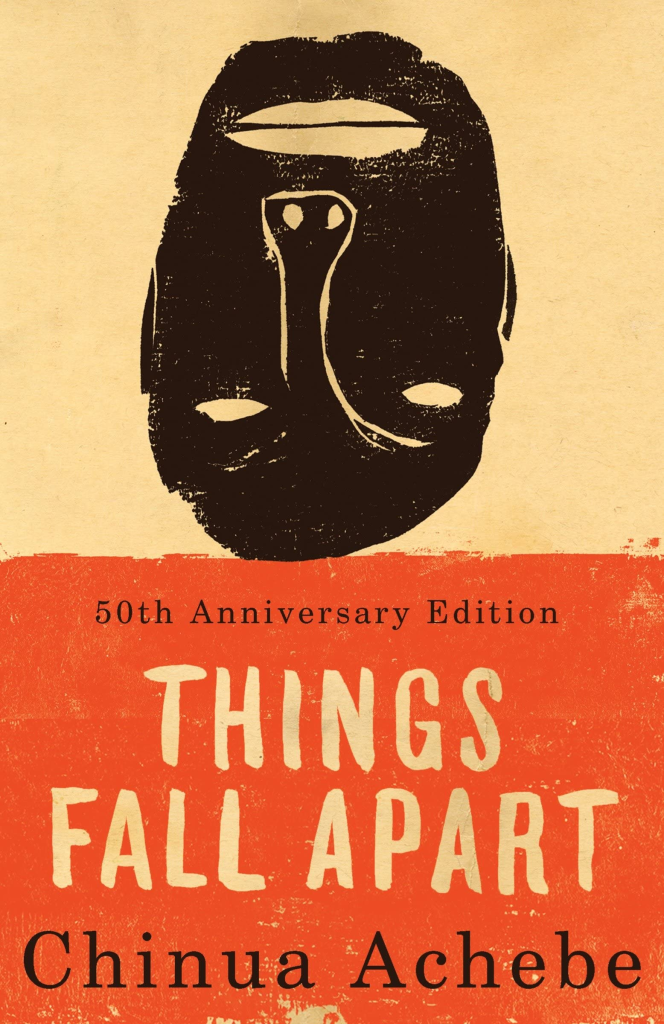
Things fall apart is a tragic novel by Nigerian author Chinua Achebe. The book was first published in 1958. The motivation of the author to write the book might have arisen from the changes that were taking place in his society at the time. Things Fall Apart is set in Pre-colonial Nigeria and reflects the struggle between colonialism and cultural traditions. It is also part of a sequel, with the other titles by the author being No Longer at Ease (1960), Arrow of God (1964), A man of the People (1966) and Anthills of the Savannah (1987).
The storyline of the novel, Things Fall Apart, follows the life of Okonkwo as the main character in the novel. In writing the novel the author is able to cut a clear picture of the inevitability of change in human life. Achebe further shows how the embrace or rejection of change can either lead to a positive or negative growth pattern in and indivdiual’s life and society at large.
In the story, Okonkwo has a great desire to be regarded as a man in his society and express masculinity in all ways. He identifies himself only with attributes of strength and does not tolerate any form of weakness. Chinua Achebe begins his novel with part of a poem:
TURNING and turning in the widening gyre
The falcon cannot hear the falconer;
Things fall apart; the center cannot hold;
Mere anarchy is loosed upon the world,(W.B.Yeats)
The poem clearly communicates about the inevitability of change. It sets out the stage for the events that follow in the entire novel.
Analysis of Plot, themes, style and characters
Plot: Chinua Achebe effectively uses plot in the communication of his message to the reader. The novel is divided into three parts. Each part of the parts marks a significant turn of events in Okonkwo life as the leading character in the novel. The author has used the life of Okonkwo in all its dimensions to bring to life the message he hopes to put across. The first part of the novel marks Okonkwos’ success and rise to fame in his community. He achieves many titles of honour and succeeds in casting off his fathers’ shadow of a tainted legacy, and one of of failure and shame.
The second part of the novel introduces a change in Okonkwo’s life. He kills a fellow Kinsman and is forced into exile in Mbanta (his motherland), as per the customs of his community (Umuofia). He is banished from his community for seven years. All that Okonkwo had worked hard to achieve was ‘falling-apart’. The image of his father as indolent, poor man, and which he had almost succeeded in casting off, was slowly catching up with him. Once in his motherland, Okonkwo starts all over again in the process of rebuilding his life. This marks the second part of the novel.
In the last part, he heads back to Umuofia, only to find major changes have taken place. There is the presence of the ‘white-man’, settling among the ‘Umuofians’. In a feat of resistance to change, Okonkwo kills a messenger from the authorities. At the end, Okonkwo ends up taking his own life other that accepting change. He submits to the same end which he had always fought against, which is one of shame and defeat.
Themes
In terms of the themes explored by the author, a number of them can be identified. Apart from the inevitability of change, the author has also explored the role of superstitions in human existence.
Style
The speaker in the novel is all knowing and employs omniscient narration in the description of the events unfolding in the novel. Nothing is hidden from the eye of the narrator, which enables him to effectively explore the characters and events going on in the novel.
Characters
There are a number of characters used by the author to relay his message in the novel. Okonkwo (major character), Unoka (Okonkwos’ father), Nwoye (Okonkwos’ son), Ezinma (Okonkwos’ daughter) and ikemefuna (Okonkwos’ adopted son).
The author has succeeded in using all the tools at his disposal (plot, style,characters e.t.c) in his effort to develop themes and deliver the message through the novel. He has effectively made use of form and structure to clearly communicate the development of events in his novel.
Reblogged this on | Fasihi | Literature in Africa | and commented:
Book Review: Things Fall Apart by Chinua Achebe
The speaker in the novel is all knowing and employs omniscient narration in the description of the events unfolding in the novel. Nothing is hidden from the eye of the narrator, which enables him to explore the characters and events going on in the novel effectively.
LikeLike
Quite good work
LikeLike